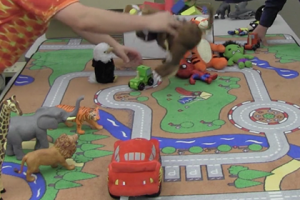Pretend play helps children develop a wide range of cognitive skills and is, therefore, a critically important skill for kids to learn. Some children, such as those on the Autism Spectrum, have difficulties engaging in pretend play. This project seeks to understand and model what constitutes successful pretend to play in order to design and implement technologies to support and facilitate highly engaging pretend to play. The exact nature of that intervention is an open question, and we are exploring several exciting options including a robotic play partner and an immersive virtual play world. The first step in this initiative is building a cognitive model of play and then developing a computational framework that enables an artificial intelligence system to generate improvisational play behaviors based on our computational model of play. In our demo, we will show some early results from a study observing adult dyads engaged in play behavior as well as the first prototype of the immersive virtual play world.

The Expressive Machinery Lab (formerly ADAM Lab) explores the intersection between cognition, creativity, and computation through the study of creative human endeavors and by building digital media artifacts that represent our findings. Applications of our findings range from AI-based digital performance to interactive narrative experiences to educational media design and development.



